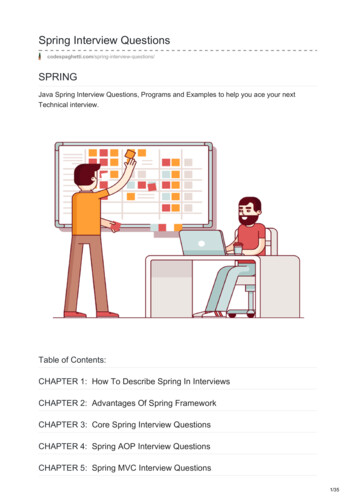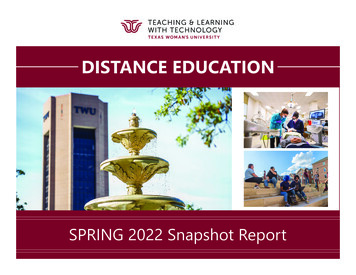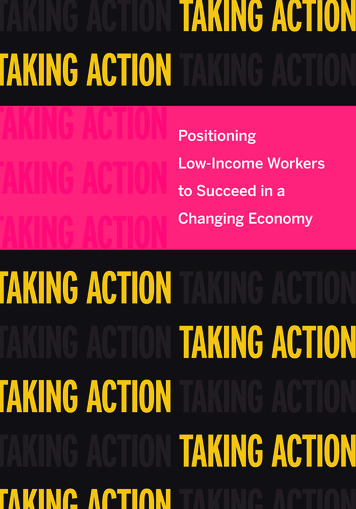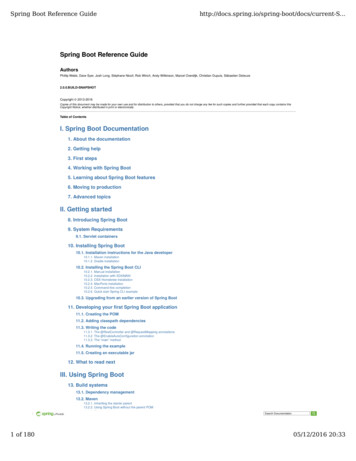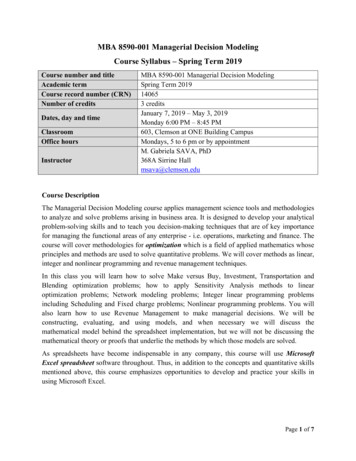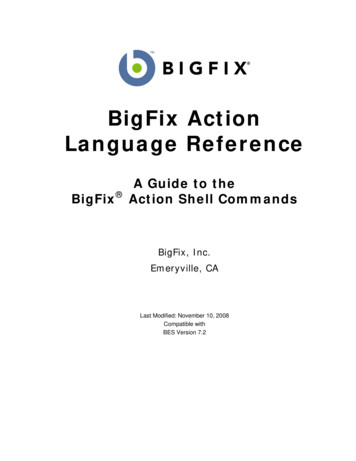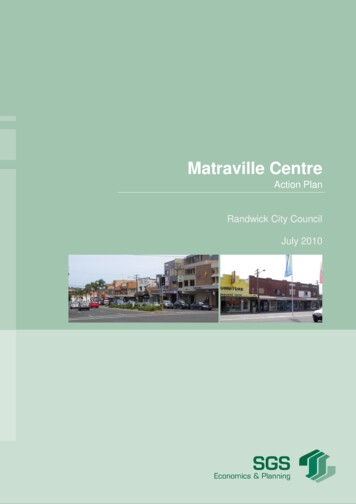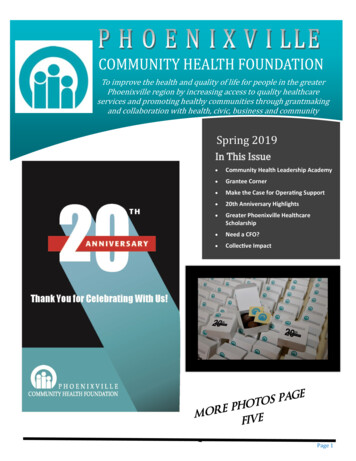
Transcription
To improve the health and quality of life for people in the greaterPhoenixville region by increasing access to quality healthcareservices and promoting healthy communities through grantmakingand collaboration with health, civic, business and communitySpring 2019In This Issue Community Health Leadership Academy Grantee Corner Make the Case for Operating Support 20th Anniversary Highlights Greater Phoenixville HealthcareScholarship Need a CFO? Collective ImpactPage 1
Community Health Leadership AcademyClass of 2019Zamelia DoswellBlack Light ProjectsJane DugdaleRestorative Garden atPhoenixville Cancer CenterAlyssa Meier‘Walk & Talk’ CaregiversProgramLara GrahamAll things Grow with Love—aPerennial Garden at Phx.Women’s OutreachElizabeth GrimshawCrescendo Phoenixville—Kids, Community, MusicEmily McCarthyLife Support for FirstRespondersRebecca PeckMilitary Veteran Banners inPhoenixvilleChelsea PeruginiSexual & ReproductiveHealth Resources PhoenixvilleTheresa ThorntonA Nonprofit Village for theAll-Inclusive PlaygroundThe Community HealthLeadership Academy isfounded on the belief thatthe more people get involvedin the community for thepurpose of positive change,the stronger and healthierthe community will be.Page 2
Grantee Corner Organizations fulfilling their missionsChester County FuturesPhoenixville Area SeniorCenterMom’s HouseCommunity VolunteersIn MedicinePage 3
Five Ways to Make the Case for Operating SupportEmily Haynes / The Chronicle of Philanthropy 3/2019Many charities struggle to pay for overhead costs that are essential to their work but don’tproduce flashy results. That is because most donors and grant-makers prefer to support projectswith tangible outcomes. Here are some tips on how to attract general operating support: Ask for funding that helps you respond to changing events:Non-profit work generally falls into two camps—proactiveand reactive. Grant-funded programs usually addressproactive work, which has a clear strategy and benchmarksfor success. However, to react to changing community needswith agility, charities need unrestricted funds. Factoringrapid-response programs into applications for generaloperating support helps grant-makers see the connectionbetween unrestricted grants and your ability to meetemergency needs.Fundraisers should seeksupport for “programmingthat is in response to needand not necessarilyplanned”.Glen O’Gilvie, CEOCenter for Nonprofit Advancement Cultivate the Program Officer: Like so much in development, the door to unrestricted supportopens through a relationship. Fundraisers“The more information that you can providesuggest treating program officers liketo the program officer, the easier their job isprospective donors. Frank conversations canto sell the grant to their board”.also help your organization tailor itsJack Lorenz, Director of Developmentapplication to a foundation’s needs andAlliance for Housing and Healinginterests. Use budget narratives to strengthen your case: The Center for Nonprofit Advancement learnedthrough debriefs that grant-makers wanted budgets with greater detail. Add a writtendescription of what each proposed budget would accomplish, along with explanatoryfootnotes. Connect operational support to program success: Explain to potential grant-makers thatoperational support helps programs run smoothly. You can foster the understanding thatoperational support is program support. If computers don’t work, if the printers don’t print, ifthe air conditioning doesn’t work people burn out. Use data to highlight funding gaps: What you needto understand is what gaps are you trying tocover with the general operating support? Tounderstand these costs, think strategically abouthow you currently cover your costs andaccomplish your organization’s mission with yourexisting sources of revenue.“It involves an examination of yourVision, your business model, and youroperations which are constantly shiftingand moving.”Oscar Cruz, CEOFamilies in SchoolsPage 4
20th AnniversaryActivities Historical Society ofthe Phoenixville AreaExhibit ChesCo Pops Concert Movie in the Park Phoenixville HospitalFall Fest Anniversary Reception Woodland String BandPage 5
PCHF NEWS!Greater Phoenixville Healthcare ScholarshipThis scholarship program is a partnership among the Foundation,Phoenixville Hospital and the Phoenixville Hospital Medical Staff,Since the Foundation’s inception, PCHF has been the managing partner . Thisis an 8,000 scholarship, payable over four years. It is open to graduatinghigh school seniors, from schools within the greater Phoenixville region, whoare pursuing a career in health care.For 2019 the Foundation funded four scholarships. This year’s scholarship awardees are: ChristinaMcFadden from Perkiomen Valley High School attending Misericordia University majoring inOccupational Therapy; Elizabeth Payne from the Technical College High School-Pickering attendingDelaware County Community College majoring in Nursing with plans to continue to a four yearuniversity; Shelby Slemmer from Owen J. Roberts High School attending Drexel University majoring inNursing; and, Sriya Vontela from Great Valley High School attending Elizabethtown College/PennState University majoring in Biology/Pre-Med.Many thanks to the Scholarship Selection Committee: Anna Mae Galbraith, MBA, MSN;Maria Schwab, E.D.; and Theresa Thornton— All members of the Foundation’s Board of Directors.Does Your Nonprofit Need a CFO?Maillie BlogThe nonprofit CFO is a senior-level position charged with oversight of accounting and finances. Theywork closely with the executive director, finance committee and Treasurer, and, serves as a businesspartner. The CFO typically reports to the executive director or the board of directors. They analyzeinvestments and capital, develop budgets and devise financial strategies.How do you know if you need a CFO? Weigh the following factors: Size of your organization Complexity & types of revenue sources Number of programs that require funding Strategic growth planningAt minimum, recruit a CFO with in-depth knowledge of the finance, accounting and tax rulesparticular to nonprofits. Someone working only in the for-profit sector may find the differencesdifficult to navigate. The ideal candidate should have a CPA and ,optimally, and MBA. Strongcommunication skills, strategic thinking, financial reporting expertise and creativity should berequirements. Finally, the CFO should have a passion for your mission.Page 6
Collective ImpactMaille blog 6/2019Collective Impact? It is more than collaboration. It is the commitment of importantplayers, from different sectors, to a common agenda for solving a specific social problem.These players can include nonprofits, government, businesses and communities.There are typically five prerequisites necessary to produce a successful initiative:1. COMMON AGENDA All participants must have a shared vision for change based on acommon understanding of the problem. Differences of opinion about the problem - andthe goals for addressing it —must be resolved to prevent division.2. SHARED MEASURMENT SYSTEMS A shared agenda will be of little value unless all agreeon how success will be measured and reported—same approach to data collection and metrics tofoster accountability and information sharing.3. MUTUALLY REINFORCING ACTIVITIES Althoughcollective impact depends on stakeholdersworking together, that does not mean they allmust do the same thing. Each should beencouraged to harness its strengths in a way thatsupports and coordinates with the others.4. CONTINUOUS COMMUNICATION The biggestchallenge is the need for trust amongstakeholders. Trust develops over time. The mosteffective initiatives keep the lines ofcommunication open and encourage stakeholdersto meet in person regularly.5. BACKBONE SUPPORT ORGANIZATIONS Collective impact requires a separateorganization with its own infrastructure . This includes dedicated staff to plan, manageand support.Perhaps the closest the Phoenixville Community Health Foundation has come to CollectiveImpact is the Ride For Health Initiative — bringing together business [Pottstown CabCompany], transportation management experts [TMACC], non-profit organizations, and theFoundation. The Initiative utilizes all of the above 5 points to provide transportation optionsfor individuals, without a mode of transportation, and assisting them in accessing health andhuman services critical to their health and well-being.We are not solving the core transportation issues but rather finding a local solution,utilizing all available resources, to ensure that people can get where they need to be and getback home safely.Page 7
ON-GOING MINI-GRANTS AVAILABLECOMMUNITY HEALTH FOUNDATION 821 GAY STREETPHOENIXVILLE, PENNSYLVANIA 19460 PHONE: 610-917-9890FAX: 610-917-9861EMAIL: pchf1@pchf1.orgWEB: www.pchf1.org AED Mini-Grant Program: To assist with thepurchase of Automatic External Defibrillator devicesCapacity-Building: To assist with training &educational programs that strengthen governancestructure, program accountability & programsustainabilityHealth Education: For teachers, nurses and nonprofitorganization serving children and families tointroduce innovative teaching techniques andeducational opportunitiesSEE www.PCHF1.org FOR FULL DETAILSFoundation StaffVision, Values & GoalsOur Vision is to make the greaterPhoenixville region one of the healthiestplaces to live and work in theCommonwealth of Pennsylvania.Our Values are that the activities of theFoundation are characterized by thefollowing principles: Ethical behavior to preserve the publictrust Actions accountable to the Foundation’sstakeholders Compassion for the communities theFoundation serves Responsiveness and sensitivity to thesecommunities’ needs Fair, respectful, honest and professionalrelations Passion in pursuit of philanthropicexcellenceOur Goals are to: To improve healthcare access forvulnerable populations in ourcommunity To support leadership and innovation incommunity health systems and servicedelivery that contributes to better carefor residents, better communityoutcomes, and lower costs To enhance the quality of life for allresidents by encouraging healthy livingand healthy communitiesLouis J. Beccaria, PhDPresident/CEOCarol PoinierVice President-AdministrationLynn Pike HartmanVice President-ProgramsHolly MegayAdministrative AssistantFoundation Board of DirectorsCharles Benz, Director[Community Banking]Jessica Capistrant, Director[Business & Industry]John Colarusso, Chair[Real Estate]Richard Downs, EmeritusLauren Eustis, Director[Architect]Kathryn Evans, Secretary[Affordable Housing]David Frees, Jr., EmeritusAnna Mae Galbraith, Director[Public Health]David Gautreau, Vice Chair[Business]Frank V. Giardina, Director[Insurance]Anita Guzmán, Director[Latino CommunityRepresentative]James Kovaleski, Esq., Director[Municipal GovernmentRepresentative]Richard Kunsch, Sr., EmeritusRev. Dr. Koshy Mathews, Director[Clergy]Julian McCracken, Director[CFO]Michael Polin, Treasurer[Wealth Management]James Reading, EmeritusMaria Schwab, Ed.D. Director[Education]Theresa Thornton, Director[Community Representative]Martin Vinca, MD , Director[Phoenixville Hospital Medical Staff]Page 8
McFadden from Perkiomen Valley High School attending Misericordia University majoring in Occupational Therapy; Elizabeth Payne from the Technical College High School-Pickering attending Delaware County Community College majoring in Nursing with plans to continue to a four year
